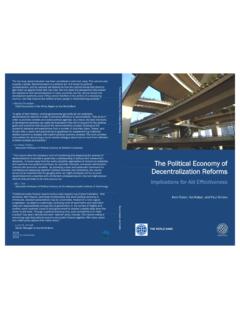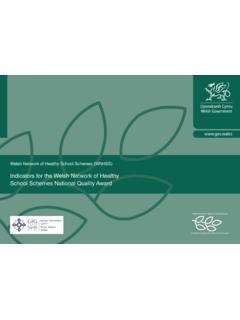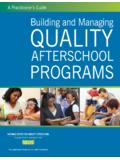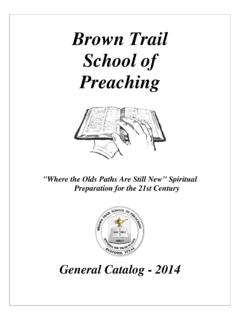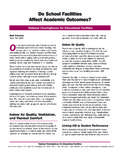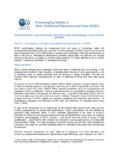Transcription of The Impact of School Quality, Socio-Economic …
1 The Impact of School quality , Socio-Economic factors and Child Health on Students Academic Performance: Evidence from Sri Lankan Primary Schools Harsha Aturupane The World Bank Paul Glewwe Department of Applied Economics University of Minnesota Suzanne Wisniewski Department of Applied Economics University of Minnesota July, 2007 Abstract One of the eight Millennium Development Goals is that all children in developing countries should complete primary education. Much progress has been made toward this goal, but completing primary School does not ensure that students have attained basic literacy and numeracy skills. Indeed, there is ample evidence that many children in developing countries are not learning these skills despite years of School attendance. This raises the question: What can schools and communities do to increase the learning that takes place in schools?
2 Sri Lanka exemplifies these issues. It has achieved universal primary completion, but many Sri Lankan primary School students perform poorly on academic tests. This paper uses an unusually rich data set from Sri Lanka to investigate the determinants of academic performance (as measured by cognitive achievement tests) of grade 4 Sri Lankan students. At the child and household level, educated parents, better nutrition, high daily attendance, enrollment in private tutoring classes, exercise books. and electric lighting and children s books at home all increase learning, while hearing problems have a strong negative effect. Among School variables, principals and teachers years of experience, collaborating with other schools in a School family , and meetings between parents and teachers all have positive impacts on students test scores.
3 A final section provides recommendations for education policies in Sri Lanka. I. Introduction Academic economists and international development agencies claim that an educated population is essential for economic growth and, more generally, for a higher quality of life (Lucas, 1988; Barro, 1991; Mankiw, Romer and Weil, 1992; UNDP, 2003; World Bank, 2000). One of the eight Millennium Development Goals is that by 2015 all children in developing countries should finish primary School . Yet developing country students who finish primary School often perform poorly on academic tests (Glewwe and Kremer, 2005), and the value of a low quality education may be low. This raises the question: What can developing countries do to promote learning in their schools? This paper investigates the determinants of learning among fourth grade students in Sri Lanka.
4 Sri Lanka has already attained universal primary completion (see Bruns et al, 2003), but many Sri Lankan students display weak academic performance, and it is unclear what education policies would improve their performance. Fortunately, there is a rich data set that can be used to analyze the academic performance of Sri Lankan fourth graders. It includes data on schools, child characteristics (including health and nutrition status), and parental support for education. This paper uses these data to study the Impact of School quality , child health, and factors other on student learning in Sri Lanka. The paper is organized as follows. Section II reviews the literature on the determinants of academic performance in developing countries. Section III describes Sri Lanka s educational system. Section IV presents the data and discusses methodological issues.
5 Sections V and VI present the estimation results and discuss their implications for policy. Section VII summarizes the findings and draws several conclusions. 1II. Review of Previous Research on Academic Performance in Developing Countries Many studies have attempted to estimate the Impact of School and teacher characteristics on student performance, yet most have serious estimation problems that cast doubt on their results (see Glewwe, 2002, and Glewwe and Kremer, 2006). Almost all existing studies are retrospective, that is based on data collected from schools as they currently exist (in contrast to data collected from a randomized trial). Yet even the best retrospective studies offer only limited guidance due to their estimation problems, the most serious being omitted variable bias (unobserved School , household and child characteristics that are correlated with observed School variables), and measurement error in School data.
6 This has led to wide variation in the estimated impacts of key variables. For example, of 30 studies from developing countries reviewed by Hanushek (1995), 8 found significantly positive impacts of the teacher-pupil ratio on student learning, 8 found significantly negative impacts, and 14 found no significant Impact . In recent years researchers have turned to natural experiments and randomized trials. Natural experiment studies use natural variation in a School characteristic that is unlikely to be correlated with all other factors that determine learning. An (admittedly rare) example is allocating students to different schools based on a lottery. Two recent natural experiments suggest that: 1. Increases in School resources (measured by student-teacher ratios) raise scores on reading (but not math) tests among black South African students (Case and Deaton, 1999); and 2.
7 Vouchers that provide funds for Colombian secondary students to attend private schools raise reading test scores (Angrist et al, 2002). Studies in Israel suggest that reducing class size raises reading scores and perhaps math scores, but providing computers has no effect (Angrist and Lavy, 1999; 2002). 2 Randomized trials have provided evidence from several developing countries. In Nicaragua, workbooks and radio instruction raised pupils' math scores (Jamison et al., 1981). Textbooks raised test scores in the Philippines (Heyneman et al., 1984), but in Kenya textbooks had effects only among the best students, perhaps because the textbooks were difficult for most students (Glewwe, Kremer and Moulin, 2006). Evidence from Kenya also suggests little Impact on test scores from flip charts (Glewwe et al, 2004).
8 Recent research shows that children s health can affect their schooling outcomes. Such research faces similar econometric challenges, yet a few recent papers have used credible methods to quantify the Impact of early childhood health and nutrition on schooling outcomes. Height for age, a cumulative indicator of children s health status, increases School enrollment (Glewwe and Jacoby 1995, Alderman et al. 2001). Glewwe, Jacoby and King (2001) used panel data from the Philippines to show that well nourished children perform better in School because they enroll earlier and learn more per year of School . Miguel and Kremer (2004), using a randomized trial, find that deworming drugs increased School attendance, but not test scores, among Kenyan primary School students. Another problem with studies on developing countries is that it is unclear whether the findings on one country apply to others, especially those with very different histories, cultures and education systems.
9 Thus the best policy advice for Sri Lanka requires Sri Lankan data. The rest of this paper examines the factors that affect the academic performance of grade 4 students in Sri Lanka, giving special attention to the estimation problems mentioned above. 3 III. Primary Education in Sri Lanka This section reviews education and student academic performance in Sri Lanka. The first subsection describes Sri Lanka s education system, focusing on its primary schools, and the second examines the test performance of grade 4 students. A. Sri Lanka s Education System. Despite its low income of about $1,030 per capita, Sri Lanka has enrolled nearly all primary aged (age 5-10) children in School ; the net primary enrolment rate is 96%, and the primary completion rate is 95%. Gender equity also prevails; boys and girls enrollment rates are equal at the primary, secondary and tertiary levels.
10 These achievements reflect several policies. First, starting in the 1950s Sri Lanka established a complete, nation-wide network of free public schools. Second, since the 1970s the government has provided free textbooks and uniforms to all students. Third, School enrollment has been compulsory since 1997 for all children 6 to 14 years old (although generally no penalty is imposed for non-enrollment). Finally, Sri Lankan parents have a high demand for education (Aturupane, 1999). Sri Lanka s education system has two unusual features. First, private schools are rare; a law passed in the early 1960s forbids the opening of new private schools, although existing private schools are allowed to operate). Second, most schools offer both primary and secondary grades. In almost all urban areas the typical School offers the full cycle (grades 1 to 13).





